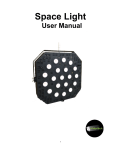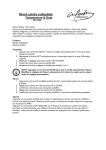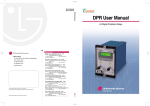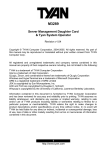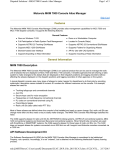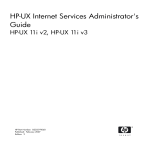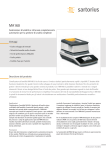Download SAS-E Man
Transcript
EPSILON SWITCH & AMPLIFIER SYSTEM E (SAS17E & SAS36E) USER’S MANUAL 95 Methodist Hill Drive Rochester, NY 14623 Phone: US +1.585.321.5800 Fax: US +1.585.321.5219 3 Avenue du Canada 91974 Les Ulis, France Phone: +33(0)1.64.53.39.80 Fax: +33(0)1.64.53.39.81 www.spectracomcorp.com www.spectracom.fr Ref. Number 170024-D1 Manual Revision D1 08 September 2008 Copyright © 2008 Spectracom Corporation. The contents of this publication may not be reproduced in any form without the written permission of Spectracom Corporation. Specifications subject to change or improvement without notice. Spectracom, EPSILON CLOCK, NetClock, Ageless, TimeGuard, TimeBurst, TimeTap, LineTap, MultiTap, VersaTap, and Legally Traceable Time are Spectracom registered trademarks. All other products are identified by trademarks of their respective companies or organizations. All rights reserved. SPECTRACOM LIMITED WARRANTY LIMITED WARRANTY Spectracom warrants each new product manufactured and sold by it to be free from defects in software, material, workmanship, and construction, except for batteries, fuses, or other material normally consumed in operation that may be contained therein AND AS NOTED BELOW, for five years after shipment to the original purchaser (which period is referred to as the “warranty period”). This warranty shall not apply if the product is used contrary to the instructions in its manual or is otherwise subjected to misuse, abnormal operations, accident, lightning or transient surge, repairs or modifications not performed by Spectracom. The GPS receiver is warranted for one year from date of shipment and subject to the exceptions listed above. The power adapter, if supplied, is warranted for one year from date of shipment and subject to the exceptions listed above. THE TIMEVIEW ANALOG CLOCKS ARE WARRANTED FOR ONE YEAR FROM DATE OF SHIPMENT AND SUBJECT TO THE EXCEPTIONS LISTED ABOVE. THE TIMECODE READER/GENERATORS ARE WARRANTED FOR ONE YEAR FROM DATE OF SHIPMENT AND SUBJECT TO THE EXCEPTIONS LISTED ABOVE. THE WIRELESS CLOCK SYSTEM TRANSMITTERS AND/OR TRANSCEIVERS AND CLOCKS ARE WARRANTED FOR TWO YEARS FROM DATE OF SHIPMENT AND SUBJECT TO THE EXCEPTIONS LISTED ABOVE. THE EPSILON CLOCKS, BOARDS, AND SYNCHRONIZATION UNITS ARE WARRANTED FOR TWO YEARS FROM DATE OF SHIPMENT AND SUBJECT TO THE EXCEPTIONS LISTED ABOVE. The Rubidium oscillator, if supplied, is warranted for two years from date of shipment and subject to the exceptions listed above. All other items and pieces of equipment not specified above, including the antenna unit, antenna surge suppressor and antenna pre-amplifier are warranted for 5 years, subject to the exceptions listed above. WARRANTY CLAIMS Spectracom’s obligation under this warranty is limited to infactory service and repair, at Spectracom’s option, of the product or the component thereof, which is found to be defective. If in Spectracom’s judgment the defective condition in a Spectracom product is for a cause listed above for which Spectracom is not responsible, Spectracom will make the repairs or replacement of components and charge its then current price, which buyer agrees to pay. Spectracom shall not have any warranty obligations if the procedure for warranty claims is not followed. Users must notify Spectracom of the claim with full information as to the claimed defect. Spectracom products shall not be returned unless a return authorization number is issued by Spectracom. Spectracom products must be returned with the description of the claimed defect and identification of the individual to be contacted if additional information is needed. Spectracom products must be returned properly packed with transportation charges prepaid. Shipping expense: Expenses incurred for shipping Spectracom products to and from Spectracom (including international customs fees) shall be paid for by the customer, with the following exception. For customers located within the United States, any product repaired by Spectracom under a “warranty repair” will be shipped back to the customer at Spectracom’s expense unless special/faster delivery is requested by customer. Spectracom highly recommends that prior to returning equipment for service work, our technical support department be contacted to provide trouble shooting assistance while the equipment is still installed. If equipment is returned without first contacting the support department and “no problems are found” during the repair work, an evaluation fee may be charged. EXCEPT FOR THE LIMITED WARRANTY STATED ABOVE, SPECTRACOM DISCLAIMS ALL WARRANTIES OF ANY KIND WITH REGARD TO SPECTRACOM PRODUCTS OR OTHER MATERIALS PROVIDED BY SPECTRACOM, INCLUDING WITHOUT LIMITATION ANY IMPLIED WARRANTY OR MERCHANTABILITY OR FITNESS FOR A PARTICULAR PURPOSE. Spectracom shall have no liability or responsibility to the original customer or any other party with respect to any liability, loss, or damage caused directly or indirectly by any Spectracom product, material, or software sold or provided by Spectracom, replacement parts or units, or services provided, including but not limited to any interruption of service, excess charges resulting from malfunctions of hardware or software, loss of business or anticipatory profits resulting from the use or operation of the Spectracom product or software, whatsoever or howsoever caused. In no event shall Spectracom be liable for any direct, indirect, special or consequential damages whether the claims are grounded in contract, tort (including negligence), or strict liability. EXTENDED WARRANTY COVERAGE Extended warranties can be purchased for additional periods beyond the standard five-year warranty for those products covered under five-year warranty. Contact Spectracom no later than the last year of the standard five-year warranty for extended coverage. www.spectracomcorp.com www.spectracom.fr Spectracom Corporation iii EPSILON Switch & Amplifier System E User’s Manual EPSILON Switch & Amplifier System E Spectracom Corporation Table of Contents 1 1.1 1.2 1.3 1.4 1.5 1.6 1.7 1.7.1 1.7.2 2 2.1 2.2 2.3 2.4 2.5 2.6 2.7 2.8 2.9 3 3.1 3.2 3.3 3.4 3.4.1 3.5 3.6 4 4.1 4.1.1 4.1.2 4.1.3 4.1.4 4.1.5 4.1.6 4.1.7 4.1.8 5 5.1 5.2 6 6.1 iv INTRODUCTION ............................................................................................... 1-1 Terminology....................................................................................................... 1-2 Inventory............................................................................................................ 1-2 Inspection .......................................................................................................... 1-2 SAS17E Synoptic .............................................................................................. 1-3 SAS36E Synoptic .............................................................................................. 1-4 Dimensions and Weight..................................................................................... 1-5 Front and Rear Panel ........................................................................................ 1-7 SAS17E ............................................................................................................. 1-7 SAS36E ............................................................................................................. 1-8 FEATURES........................................................................................................ 2-1 Main Power Supply............................................................................................ 2-1 DC Power Supply .............................................................................................. 2-1 Input Signals...................................................................................................... 2-2 Output Signals ................................................................................................... 2-3 Urgent Alarm ..................................................................................................... 2-4 Non-Urgent Alarm.............................................................................................. 2-4 Ethernet Port ..................................................................................................... 2-5 Operating Environment...................................................................................... 2-5 EMC .................................................................................................................. 2-5 INSTALLATION ................................................................................................. 3-1 Powering Up ...................................................................................................... 3-1 Network Connection .......................................................................................... 3-1 Configuring and Operating the SAS-E............................................................... 3-2 Status of the SAS-E........................................................................................... 3-4 Status LED ........................................................................................................ 3-4 Alarm ................................................................................................................. 3-5 Powering Down ................................................................................................. 3-6 WEB INTERFACE ............................................................................................. 4-1 Web Pages ........................................................................................................ 4-1 Welcome Page .................................................................................................. 4-1 Upper Task Bar and Page Header .................................................................... 4-2 SAS-E Status..................................................................................................... 4-3 Admin Password Page ...................................................................................... 4-7 Network Setup Page.......................................................................................... 4-8 SNMP and Traps Setup Page ......................................................................... 4-10 SAS-E Configuration ....................................................................................... 4-13 Tools................................................................................................................ 4-15 SNMP CONTROL .............................................................................................. 5-1 MIB Content....................................................................................................... 5-1 SNMP Traps ...................................................................................................... 5-2 MAINTENANCE................................................................................................. 6-1 Updating the Software Version .......................................................................... 6-1 User’s Manual Spectracom Corporation v EPSILON Switch & Amplifier System E User’s Manual Spectracom Corporation EPSILON Switch & Amplifier System E 1 Introduction This document is the User’s Manual for the EPSILON Switch and Amplifier System E17 and the EPSILON Switch and Amplifier System E36. (Unless otherwise indicated, details contained herein apply to both models.) The SAS-E achieves redundant Time & Frequency source monitoring with intelligent and automatic switching. It amplifies signals from the selected source and offers a large quantity of output channels. The SAS-E receives, and monitors continuously, signals from 1 or 2 external clocks: • • • • • Frequency sine wave signal (from 1 MHz up to 16 MHz) 1 pulse per second time synchronization (TTL/50Ω) Time Of Day message (RS232C serial line) External signals External clock status (relay contact) Monitoring results (lost signal and minimal period detection) are reported to the user through dedicated LEDs and through an Ethernet port. When 2 external clocks are connected, the SAS-E offers a powerful redundant function by selecting, automatically, the better source. This automatic selection may be by-passed by the user to allow maintenance or for single clock operation. In all cases, the distributed signals — Frequency, 1 Pulse Per Second (PPS), Time of Day (ToD) — are issued from the same source clock. In automatic mode, when the current selected source is detected faulty, the SAS-E switches all the distributed signals to the other source. An Ethernet port allows managing and controlling the SAS-E through embedded SNMP protocol and/or web server. The SAS-E is available in two heights to adapt the output capacity to the user’s requirements: SAS17E — 1u High Version: 8 x frequency outputs, 8 x 1PPS outputs, 2 x ToD outputs, 2 x external signals. SAS36E — 2u High Version: 16 x frequency outputs, 16 x 1PPS outputs, 2 x ToD outputs, 2 x external signals. User’s Manual 1-1 EPSILON Switch & Amplifier System E Spectracom Corporation 1.1 Terminology DHCP IP MIB NTP OID PPS SAS SNMP ToD USB Dynamic Host Configuration Protocol Internet Protocol Management Information Base Network Time Protocol Objet IDentifier Pulse Per Second Switch & Amplifier System Single Network Management Protocol Serial message Time of Day Universal Serial Bus 1.2 Inventory Before installing your Spectracom product, please verify that all material ordered has been received. If there is a discrepancy, please contact Spectracom Customer Service. Customer service is available by telephone at +33 (0) 1.64.53.39.80 (France), or +1.585.321.5800 (United States). Updated contacts information are available on web site, see “Support” page. CAUTION: Electronic equipment is sensitive to Electrostatic Discharge (ESD). Observe all applicable ESD precautions and safeguards when handling the Spectracom equipment. NOTE: If equipment is returned to Spectracom, it must be shipped in its original packing material. Save all packaging material for this purpose. 1.3 Inspection Inspection Unpack the equipment and inspect it for damage. If any equipment has been damaged in transit, please contact Spectracom Customer Service. Customer service is available by telephone at +33 (0) 1.64.53.39.80 (France), or +1.585.321.5800 (United States). Updated contacts information are available on web site, see “Support” page. 1-2 User’s Manual Spectracom Corporation EPSILON Switch & Amplifier System E 1.4 SAS17E Synoptic GPS antenna GPS antenna External Clock (A source ) F r e q A Switch and Amplifier System Vac 230 Vac 24Vdc Vdc Redundant Power Supply 1 p p s A A l a r m A T o D A External Clock (B source) E x t s i g 1 p p s B F r e q B x2 A T o D B A l a r m B E x t s i g x2 B Source selection & switching F r e q 1 p p s T o D E x t s x2 i g Output amplification & distribution Signal Monit oring Ethernet port x2 8 x Freq 1-3 8 x 1 pps 2xToD Sig.Sig. ToD Ext.Ext. Alarm Alarm urg non urg User’s Manual EPSILON Switch & Amplifier System E Spectracom Corporation 1.5 SAS36E Synoptic GPS antenna GPS antenna External Clock (A source ) F r e q A Switch and Amplifier System Vac 230 Vac 24Vdc Vdc Redundant Power Supply 1 p p s A A l a r m A T o D A External Clock (B source) E x t s i g 1 p p s B F r e q B x2 A T o D B A l a r m B E x t s i g x2 B Source selection & switching F r e q 1 p p s T o D E x t s x2 i g Output amplification & distribution Signal Monit oring Ethernet port x2 16 8 x Freq 16 8 x 1 pps 2xToD Sig.Sig. ToD Ext.Ext. 1-4 Alarm Alarm urg non urg User’s Manual Spectracom Corporation EPSILON Switch & Amplifier System E 1.6 Dimensions and Weight 1-5 Height SAS17E 1u version 43.6 mm ±0.1mm Width Depth Weight 483 mm ±0.1mm 323 mm ±0.1mm 3.2 kg SAS36E 2u version 88.1 mm ±0.1mm 483 mm ±0.1mm 323 mm ±0.1mm 4.1 kg User’s Manual EPSILON Switch & Amplifier System E 1-6 Spectracom Corporation User’s Manual Spectracom Corporation EPSILON Switch & Amplifier System E 1.7 Front and Rear Panel 1.7.1 SAS17E User’s Manual 1-7 EPSILON Switch & Amplifier System E 1.7.2 1-8 Spectracom Corporation SAS36E User’s Manual Spectracom Corporation EPSILON Switch & Amplifier System E 2 Features 2.1 Main Power Supply Main power connector CCE22 with ON/OFF switch. Input voltage: 90 to 265 V / 48 to 63 Hz (60VA max.) Fuses: 2 x 250 V – 1A TD (Time Delay) Consumption: 18 W typical Detection of power input presence on AC/DC converter — information available with remote control software. 2.2 DC Power Supply Input power (VDC): 20 to 72V Consumption: < 50 W typical. Protection against polarity inversion. Protection against short-circuit: polyswitch ensures the isolation of the module in relation to the DC power supply in the event of a short-circuit of the EPSILON’s power supply. Detection of power input presence on AC/DC converter — information available with remote control software. Connector: DC POWER XLR 3 points pins male NEUTRIX reference NC3MDH Pins settings: Pin Number: 1 2 3 +VDC -VDC Earth Ground The power supply must be connected between pins 1 and 2, rear panel external view: Pin 1 VDC User’s Manual Pin 3 Earth Pin 2 -VDC 2-1 EPSILON Switch & Amplifier System E Spectracom Corporation 2.3 Input Signals Frequency_In external clock A Connector ESAS J1 Frequency_In external clock B 1PPS_In external clock A J26 1PPS_In external clock B ToD_In external clock A J25 ToD_In external clock B ALARM_In external clock A J24 ALARM_In external clock B External Signals_In external clock A J23 External Signals_In external clock B J24 2-2 J2 J3 J4 J3 Electrical Characteristics BNC Female: - Core: Sine-wave signal Frequency: 1MHz up to 16MHz Level : 0dBm up to +17dBm - Braid: electrical ground BNC Female: - Core: periodic pulse period : 1s High Level: > 2.4V load 50 Ω low Level : < 0.7V load 50 Ω - Braid: electrical ground Mini Din 6 pins Female: Pin number: 1: Reserved 4: NC 2: Reserved 5: Electrical ground 3: Electrical ground 6: Message input (*) (*): level RS232C, ASCII message Jack 3,5mm Mono Female: Input for open collector (current drive: 0,5mA) or for relay contact Braid: Electrical ground Mini Din 6 pins Female: Pin number: 1: External_signal 1 4: NC 2: External_signal 2 5: Electrical ground 3: Electrical ground 6: Reserved Characteristic: 30VA / 250V max. User’s Manual Spectracom Corporation EPSILON Switch & Amplifier System E 2.4 Output Signals Connector SASE17 J6 , J7 , J8, J9, J10, J11, J12, J13 Connector SASE36 J6 , J7 , J8, J9, J10, J11, J12, J13, J14, J15, J16 J17, J18, J19 J20, J21 1PPS_Out J14, J15, J16 J17, J18, J19 J20, J21 J27, J28, J29, J30, J31, J32, J33, J34 J35, J36, J37, J38, J39, J40, J41, J42 ToD_Out J5, J22 J5, J22 External Signals_Out J5, J22 J5, J22 Frequency_Out User’s Manual Electrical characteristics BNC Female: - Core: Sine-wave signal if external clock A selected: J2 input frequency J2 input level ± 10% if external clock B selected: J25 input frequency J25 input level ± 10% - Braid: electrical ground BNC Female: - Core: Periodic pulse if external clock A selected: J1 input periodic pulse if external clock B selected: J26 input periodic pulse High Level: > 2.4V load 50 Ω Low Level : < 0.7V load 50 Ω - Braid: electrical ground Mini Din 6 pins Female: Pin number: 1: Reserved 2: Reserved 3: Electrical ground 4: NC 5: Electrical ground 6: if external clock A selected: J3 input ToD (RS232C) if external clock B selected: J24 input ToD (RS232C) Mini Din 6 pins Female: Pin number: 1: if external clock A selected: J3 input External_signal 1 if external clock B selected: J24 input External_signal 1 2: if external clock A selected: J3 input External_signal 2 if external clock B selected: J24 input External_signal 2 3: Electrical ground 4: NC 5: Electrical ground 6: Reserved 2-3 EPSILON Switch & Amplifier System E Spectracom Corporation 2.5 Urgent Alarm Connector: Universal Serial Bus (USB) connector A series (URG) Pin Signal Description 1 Urg_al_ closed + Urgent Alarm active closed contact + 2 Urg_al_ closed Urgent Alarm active closed contact 3 Urg_al_ open + Urgent Alarm active open contact + 4 Urg_al_ open Urgent Alarm active open contact Characteristics: - Relay contact - Pin 1 and 2 closed in case of urgent alarm active - Pin 3 and 4 open in case of urgent alarm active - Resistive contact Rating: 30VA / 250V URG 2.6 NonNon-Urgent Alarm Connector: Universal Serial Bus (USB) connector A series (NURG) Pin Signal Description 1 Nurg_al_ closed + Non Urgent Alarm active closed contact + 2 Nurg_al_ closed Non Urgent Alarm active closed contact 3 Nurg _al_ open + Non Urgent Alarm active open contact + 4 Nurg _al_ open Non Urgent Alarm active open contact Characteristics: - Relay contact - Pin 1 and 2 closed in case of urgent alarm active - Pin 3 and 4 opened in case of urgent alarm active - Resistive contact Rating: 30VA / 250V NURG 2-4 User’s Manual Spectracom Corporation EPSILON Switch & Amplifier System E 2.7 Ethernet Port Connector: RJ45 (Eth) Pin Signal 1 TX+ 2 TX3 RX+ 4 5 6 RX7 8 Description Transmission signal plus Transmission signal minus Reception signal plus Reception signal minus Characteristics: - Interface 10 Base T / 100 BASE T, IEEE-802.3 compliant Full featured auto negotiation function - IP address assignment: DHCP automatic assignment or fixed IP address - Protocol: Transfer Control Protocol and Internet protocol (TCP/IP) - Web page server with HTTP protocol for configuration; status included - Configuration and status are manageable through SNMP protocol. The MIB includes a sub-set of configuration and status parameters. SNMP traps are sent to the network on event trigger. 2.8 Operating Environment - Operating temperature: Storage temperature: Relative humidity: Electromagnetic compatibility: -5 to 60°C -40 to 85°C 95 % non-condensing in accordance with EN61000/EN55022/EN60950 2.9 EMC Complies with the requirements of the standards: • • • EN 61000-6-2: ed 2005 EN 61000-6-3: ed 2007 EN55022 ed 2006 Class B User’s Manual 2-5 EPSILON Switch & Amplifier System E 2-6 Spectracom Corporation User’s Manual Spectracom Corporation EPSILON Switch & Amplifier System E 3 Installation The unit can be used by itself or mounted in a rack. Leave free space of a few centimeters under the unit, in order to facilitate natural air flow from the bottom to the top of the SAS-E. • Connecting cables for signals and power supply should be secured to locks provided for this purpose. • Connect a ground lead from the Earth pin on the SAS0E back panel to the frame of the rack. 3.1 Powering Up The SAS-E can be powered from an AC source, from a DC source, or from both. For full redundancy, connect the DC power cables to the VDC connector and the AC power cable to the AC connector. Check the polarity of the power signal before connecting it (refer to DC Power Supply and to the back panel labels for the pin-out). Priority is given to AC input. Power-up is immediate when connecting DC power with the cable, while AC power must be switched on. During power-up, check the initialization sequence process (OS boot) on the front panel. All of the LEDs should be activated. This process may take about two minutes. 3.2 Network Connection The factory IP address is 192.168.0.100 in static mode. On the back panel, a reset button allows the user to return to this IP address by default. Press the RST (reset) button and hold it for 2 seconds. The ETH LED will blink during this process. Connect the remote PC through a crossover Ethernet cable or through a network hub. Set the PC IP address to an address belonging to the same sub-network (e.g. 192.168.0.001). Press the RST button and hold it for 2 seconds. The ETH LED will blink during this process and, after roughly 5 seconds, the SAS-E will restart. Wait two minutes. On the PC, open a web browser page to http://192.168.0.100/. Click to enter the web interface. Go to the "System Setup">"Network Setup" web page. Type in the password (the factory default is "pwd"). Modify the mode of IP address allocation (static or DHCP) and static address as necessary. If the SAS-E is already DHCP configured and if no DHCP server is available, you cannot connect a PC to access the SAS-E network configuration pages. You may use the reset button on the back panel to reset the IP address in this case. User’s Manual 3-1 EPSILON Switch & Amplifier System E Spectracom Corporation 3.3 Configuring and Operating the SASSAS-E The SAS-E must be configured through an Ethernet network with a web browser. After the boot sequence, open a browser to the SAS-E IP address (http://192.168.0.100). Go to “SAS-E Configuration” > “SAS-E Setup” and program the setup parameters as follows. 1 2 3 4 5 6 7 8 9 For both channels, the fields (2 to 5) allow the user to set up the signal monitoring process. Each input of the SAS-E (Frequency, 1 PPS, ToD, and Alarm) can be monitored individually with the “Enable” or “Disable” selections. The channel is considered OK when all monitored signals are connected and present. The field (1) “Channel” allows the user to monitor the channel inputs. When this field is on “only A” or “only B”, the SAS-E forces the selected channel, whatever the results of the over channel. The switching function is disabled. The default of the channel (loss of one monitored signal) generates an Urgent alarm. The SAS-E does not switch on the other channel. The front panel switch is locked. 3-2 User’s Manual Spectracom Corporation EPSILON Switch & Amplifier System E When, this field in on “A and B”, the SAS-E monitors both channels and the channel selection (A or B) depends on: o The results of the signal monitoring process (according the choices on fields 2 to 5) o The programming of field 8, “Network channel selection”, and field 9, “front panel” o The front panel switch In this configuration, the SAS-E has 3 modes: o “Forced A”: When this mode is selected, the LED “AUTO” in the front panel is always off and the LED “A” is on. This mode forces the selected channel A, whatever the results of the signal monitoring process. In the case of a channel A default, the “Urgent Alarm” is active, and in the case of a channel B default, the “Non Urgent Alarm” is active. o “Forced B”: When this mode is selected, the LED “AUTO” in the front panel is always off and the LED “B” is on. This mode forces the selected channel B, whatever the results of the signal monitoring process. In the case of a channel B default, the “Urgent Alarm” is active, and in the case of a channel A default, the “Non Urgent Alarm” is active. o “Automatic”: When this mode is selected, the LED “AUTO” in the front panel is always on. The selection of the channel (A or B) depends on the results of the monitoring process. The following table gives the source selection versus fault detection. Channel A Channel B Selected Channel(*) Non Urgent Alarm Urgent Alarm NOK NOK No change Active Active OK NOK A Active Non active NOK OK B Active Non active OK OK No change Active Active (*): No change: Same channel as in the previous state Those 3 modes can be selected with: o Field 8 “Network channel selection”, which allows the user to force the SAS-E mode through the Ethernet port o Field 9, “Front panel switch” which allows the user to enable or disable the front panel switch o The front panel switch, when it is enabled through the Ethernet port User’s Manual 3-3 EPSILON Switch & Amplifier System E Spectracom Corporation It is possible to enable or disable the front panel switch via the Ethernet port. When disable, the front panel switch has no action on the selection mode and this one could be only changed via the field “network channel selection” or via the embedded SNMP “network channel selection” command. When the front panel switch is enabled, the field “Network channel selection” has no action on the selection mode. When the front panel switch is enables, to set the SAS-E in the mode… o “Forced A”, press and hold the key A for more than 2 seconds o “Forced B”, press and hold the key B for more than 2 seconds o “Automatic”, press and hold the key “auto” for more than 2 seconds. According to the available power sources, enable or disable the Power Alarms using the "AC Presence“ and “DC Presence” fields. A default on a supervised power generates a “Non Urgent Alarm”. All parameters are saved in a flash EPROM and are reloaded on further reboot. In the case of a reboot and when the panel switch is enabled while Channel A and B are monitored, the selection mode is set in the automatic mode by default. 3.4 Status of the SASSAS-E The status of SAS-E could be shown by a specific web page (refer to the web page discussion contained herein) or by the status LED on the front panel. 3.4.1 Status LED There are 4 green status LED for each source: AL: F: 1PPS: ToD: Result of alarm input monitoring, Result of frequency monitoring Result of 1PPS monitoring Result of ToD monitoring LEDs are ON when signal is monitored and present. If the signal is absent or not monitored, the corresponding LED is off. There are 3 orange status LEDs for the source selected: A: ON when the channel A is selected and used to supply the signal outputs B: ON when the channel B is selected and used to supply the signal outputs Auto: ON when the automatic mode is selected through the front panel or the Ethernet port and OFF when the SAS-E is forced on a specific channel 3-4 User’s Manual Spectracom Corporation EPSILON Switch & Amplifier System E Other LEDs: LED green AC: • ON when AC power is monitored and present • OFF when AC power is not monitored • OFF when AC power is monitored and not present (in this case, “Non Urgent alarm is active) LED green DC: • ON when DC power is monitored and present, • OFF when DC power is not monitored • OFF when DC power is monitored and not present (in this case, “Non urgent alarm is active) LED green Eth: ON when the SAS-E is connected with a network LED red “Alarm nurg”: ON when a non urgent alarm is generated LED red “Alarm urg”: ON when a urgent alarm is generated 3.5 Alarm The “Non Urgent alarm” is generated when: o Only one channel is detected fail in the case of both channel are monitored and the SAS-E is not forced on the faulty channel. The output signals are still nominal. o Both channel are monitored and there are fail. o A default on a supervised power (AC or DC) The “Urgent alarm” is generated when: o The SAS-E is forced on a channel and this one is detected as failed o Both channels are monitored and are detected as failed o At least one output is detected as failed On each alarm connector and in case of an active alarm: o The contact relay between Pin 1 and Pin 2 is closed User’s Manual 3-5 EPSILON Switch & Amplifier System E o Spectracom Corporation The contact relay between Pin 3 and Pin 4 is open 3.6 Powering Down To switch off the SAS-E, place the main power switch to the 0 position and/or unplug the DC power supply. 3-6 User’s Manual Spectracom Corporation EPSILON Switch & Amplifier System E 4 Web Interface When connecting to the SAS-E IP address with a web browser (HTTP protocol), the user can check the SAS-E status, modify setup parameters, and perform software updates. The status web pages may be accessed by the user at any time. Setup pages require a password (the factory default is “pwd”). The protocol used for accessing the SAS-E is HTTP. 4.1 Web Pages 4.1.1 Welcome Page Click to enter the web site. The first displayed page is the STATUS page. User’s Manual 4-1 EPSILON Switch & Amplifier System E 4.1.2 Spectracom Corporation Upper Task Bar and Page Header Gives access to one of the following menus: 1. System Setup: a. Network setup: Network connection parameters (protected by a password) b. SNMP and Traps setup: SNMP parameters and traps enable (protected by password) c. Logout: Log out from the web site 2. SAS-E configuration a. SAS-E setup: Configure the equipment (protected by password) b. Time setup: Configure the system time in order to date the log event (protected by password) 3. SAS-E Status: Summary of status and alarms of SAS-E 4. Tools: a. Event logging: Display of event history b. Software Version: Display of current version of software parts c. Software upgrade: Upgrading software d. Reboot: Hardware or software reset Header time information: Provided by the SAS-E 4-2 User’s Manual Spectracom Corporation 4.1.3 EPSILON Switch & Amplifier System E SAS-E Status This page contains a copy of the SAS-E front panel with all the monitored states (inputs, outputs, power supply, alarms, and the equipment type). This page is automatically refreshed every 15 seconds. User’s Manual 4-3 EPSILON Switch & Amplifier System E Spectracom Corporation Equipment type: 1. SAS17E: a. 1 U high version b. 8 x frequency outputs, 8 x 1PPS outputs, 2 x ToD outputs, 2 x external signals 2. SAS36E: a. 2 U high version b. 16 x frequency outputs, 16 x 1PPS outputs, 2 x ToD outputs, 2 x external signals Input Channel: Status of all inputs (for each channel): 1. Frequency input a. OK (Green): Frequency inputs are monitored and are present b. Alarm (Red): failed Frequency inputs are monitored and are detected as c. Disable (Gray): Frequency inputs are not monitored 2. TOD input b. OK (Green): ToD inputs are monitored and are present b. Alarm (Red): ToD inputs are monitored and are detected as failed c. Disable (Gray): ToD inputs are not monitored 3. 1PPS input a. OK (Green): 1PPS inputs are monitored and are present b. Alarm (Red): 1PPS inputs are monitored and are detected as failed c. Disable (gray): 1PPS inputs are not monitored 4. Alarm input a. OK (Green): Alarm inputs are monitored and there are no alarms on the input b. Alarm (Red): Alarm inputs are monitored and the alarm input is in alarm c. Disable (Gray): Alarm inputs are not supervised 5. Selected channel: Status of the channel selected a. Automatic A: Channel A selected with the automatic mode, either through the front panel switch or through the internet port 4-4 User’s Manual Spectracom Corporation EPSILON Switch & Amplifier System E b. Automatic B: Channel B selected with the automatic mode, either through the front panel switch or through the internet port c. Forced A: Channel A forced in manual mode, either through the front panel switch or through the internet port d. Forced B: Channel B forced in manual mode, either through the front panel switch or through the internet port 6. Channel selection source: Status of the source selection a. Network: The front panel switch is locked and the selection mode is made via the Ethernet port b. Front panel: The front panel switch is unlocked and the choice of the channel is made via the front panel switch Output Channel: Status of all Outputs: 1. Frequency output a. OK (Green): Frequency inputs are monitored and all frequency outputs are OK b. Alarm (Red): Frequency inputs are monitored and at least one frequency output is failed c. Disable (gray): Frequency inputs and outputs are not monitored 2. ToD output a. OK (Green): ToD inputs are monitored and all ToD outputs are OK b. Alarm (Red): ToD inputs are monitored and at least one ToD output is failed c. Disable (gray): ToD inputs and outputs are not monitored 3. 1PPS output a. OK (Green): 1PPS inputs are monitored and all 1PPS outputs are OK b. Alarm (Red): 1PPS inputs are monitored and at least one 1PPS output is failed c. Disable (gray): 1PPS inputs and outputs are not monitored User’s Manual 4-5 EPSILON Switch & Amplifier System E Spectracom Corporation Power Supply: Status of both power supply: 1. AC a. OK (Green): AC power is monitored and on b. Alarm (Red): AC power is monitored and off c. Disable (Gray): AC power is not monitored 2. DC a. OK (Green): DC power is monitored and on b. Alarm (Red): DC power is monitored and off c. Disable (Gray): DC Power is not monitored Alarms: Status of Alarm 1. Urgent a. OK (Green): No urgent alarm present b. Alarm (Red): An urgent alarm is present, which means that there is at least one fault on one of the outputs monitored 2. No Urgent a. OK (Green): No urgent alarm present b. Alarm (Red): A non-urgent alarm is present, which means that there is only one channel detected on fault or there is a fault in one power supply 4-6 User’s Manual Spectracom Corporation 4.1.4 EPSILON Switch & Amplifier System E Admin Password Page A password is necessary to access the Setup pages. The default password is “pwd”. It can be modified in the Network Setup page. User’s Manual 4-7 EPSILON Switch & Amplifier System E 4.1.5 Spectracom Corporation Network Setup Page This page allows the user to modify the Network connection parameters. 1) Host Name: Unique name of the SAS-E in the network. This functionality depends on the DNS server type 2) Use DHCP: Dynamic Host Configuration Protocol a. Yes: The Dynamic Host Configuration Protocol function available. In this case, the IP address of the SAS-E is automatically allocated by the network DHCP server according to the SAS-E MAC address. The fields that follow are not used. b. No: The Dynamic Host Configuration Protocol function isn’t available. A static IP address is used. In this case, the operator must fill in the fields that follow. 3) IP Address, Sub-network mask, Sub-network address, Broadcast address, Default Gateway: fields allowing configuration of the network access when the DHCP is set to No 4) Change password: Field for password modification. This password is required when accessing setup pages. 4-8 User’s Manual Spectracom Corporation EPSILON Switch & Amplifier System E When set in Use DHCP mode, if the SAS-E starts without a network connection, the IP address is not set. After the network connection is restored, a 1 or 2 minute delay occurs before the IP address is assigned. User’s Manual 4-9 EPSILON Switch & Amplifier System E 4.1.6 Spectracom Corporation SNMP and Traps Setup Page In this page, the operator can enable the SNMP Traps generation. The SNMP traps report an event (alarm or configuration modification) by sending a trap message to a destination. 4-10 User’s Manual Spectracom Corporation EPSILON Switch & Amplifier System E 1) SNMP RO community : Community name for Read-Only OIDs 2) SNMP RW community : Community name for Read-Write OIDs 3) Traps destination 1: Primary SNMP manager address where traps are sent 4) Traps destination 2: Secondary SNMP manager address where traps are sent 5) Traps Community: SNMP code word that helps in filtering the traps and identifying the managed equipment family; public by default 6) Global traps enable: If "Yes", traps are sent according to individual enabling; if "No", no traps are sent 7) Channel A Frequency Input Fault: a. Yes: Generates a trap when the frequency signal input on channel A fails b. No: No trap generated 8) Channel A 1PPS Input Fault: a. Yes: Generates a trap when the 1PPS signal input on channel A fails and is monitored b. No: No trap generated 9) Channel A TOD Input Fault: a. Yes: Generates a trap when the ToD signal input on channel A fails and is monitored b. No: No trap generated 10) Channel A Input Fault: a. Yes: Generates a trap when an alarm input on channel A monitored becomes active and is b. No: No trap generated 11) Channel B Frequency Input Fault: a. Yes: Generates a trap when the frequency signal input on channel B fails b. No: No trap generated 12) Channel B 1PPS Input Fault: a. Yes: Generates a trap when the 1PPS signal input on channel B fails and is monitored b. No: No trap generated 13) Channel B TOD Input Fault: a. Yes: Generates a trap when the ToD signal input on channel B fails and is monitored b. No: No trap generated 14) Channel B Input Fault: a. Yes: Generates a trap when an alarm input on channel B becomes active and is monitored b. No: No trap generated User’s Manual 4-11 EPSILON Switch & Amplifier System E Spectracom Corporation 15) Frequency Output Fault: a. Yes: Generates a trap when one of the output frequency signals fails and frequency inputs are monitored b. No: No trap generated 16) 1PPS Output Fault: a. Yes: Generates a trap when one of the output 1PPS signals fails and 1PPS inputs are monitored b. No: No trap generated 17) TOD Output Fault: a. Yes: Generates a trap when one of the output ToD signals fails and ToD inputs are monitored b. No: No trap generated 18) Channel Swap: a. Yes: Generates a trap when the SAS-E swaps from channel A to channel B or from channel B to channel A b. No: No trap generated 19) Power Fault: a. Yes: Generates a trap when any enabled power source alarm is detected b. No: No trap generated 20) Urgent Alarm: a. Yes: Generates a trap when an Urgent alarm is generated b. No: No trap generated 21) No Urgent Alarm: a. Yes: Generates a trap when a No Urgent alarm is generated b. No: No trap generated 22) Download MIB: Link for downloading zipped MIB text file 4-12 User’s Manual Spectracom Corporation 4.1.7 SAS-E Configuration 4.1.7.1 SAS-E Setup 4.1.7.2 Time Setup EPSILON Switch & Amplifier System E This page allows the operator to configure the SAS-E system time in order to date the log events. It is accessible with the user’s password. Manual Setup time must be set on every “switch on”. There are two ways to set up the time: o Automatically by addressing an NTP server o Manually by setting date and time User’s Manual 4-13 EPSILON Switch & Amplifier System E 1) Spectracom Corporation NTP Parameters a. Use NTP Server: i. ENABLE: An NTP server is available on the network. The System time is updated automatically on every “Request frequency” ii. DISABLE: No NTP server is available on network. The system time must be updated manually according to the fields for Time Parameters. b. NTP server Address: IP address of the NTP server in the network c. Request frequency: Number of seconds between each request 2) Time Parameters a. Date, Time, and Set button: Time manual setting when the field “Use NTP Server” is disabled. b. Manual Time Adjust: Adjust the time by 1 second when the field “Use NTP Server” is disabled. Helpful for fine adjusting manually set time. 4-14 User’s Manual Spectracom Corporation 4.1.8 Tools 4.1.8.1 Event Logging EPSILON Switch & Amplifier System E This page displays the recording of events detected (alarms, warning, information) within the SAS-E. Only the information in the MIB (Get information) is logged. “Display Filter”: select the required type of displayed event on the log panel. “Max lines”: defines the number of events per page to be displayed. “<<,<,>,>>” Buttons: Navigation through the screens. “Update list” button: Refresh display User’s Manual 4-15 EPSILON Switch & Amplifier System E 4.1.8.2 Spectracom Corporation Version This page displays the version number of key elements of SAS-E software and firmware. 4.1.8.3 Software and Firmware Upgrade Software and firmware upgrade is performed with this "Upgrade Application" page. Two steps are necessary. First, Upload a New Release, and then, Activate New Release. Before starting the upload new version process, select the file to be downloaded (usually a .tgz file provided by the manufacturer). Click on the "Upload" button to proceed. 4-16 User’s Manual Spectracom Corporation EPSILON Switch & Amplifier System E The uploaded release is shown in the “Application Version” field. The actual version is the running version. Clicking on the “Install New version” button,” will result in an automatic restart of the SAS-E. The “Delete File “ option is not used. User’s Manual 4-17 EPSILON Switch & Amplifier System E 4.1.8.4 Spectracom Corporation Reboot This page allows the operator to perform a software or hardware reset. This page is accessible with the user’s password. Reset type: - Software: Reset only the Ethernet port (including Web server and SNMP server). This reset has no effect on the signals selection and distribution. - Hardware: Reset the SAS-E. This reset affects the signals selection and distribution. 4-18 User’s Manual Spectracom Corporation EPSILON Switch & Amplifier System E 5 SNMP Control 5.1 MIB Content The MIB is made of elements related to: - Configuration parameters that can be read (GET procedure ) and written (SET procedure). - Status information, similar to the status displayed on page web, that can be read (GET procedure). Status: - Selected channel (Get) - Channel source selection (Get) - Urgent alarm status (Get + Trap) - No urgent alarm status (Get + Trap) - Frequency input channel A status (Get + Trap) - PPS input channel A status (Get + Trap) - TOD input channel A status (Get + Trap) - Alarm input channel A status (Get + Trap) - Frequency input channel B status (Get + Trap) - PPS input channel B status (Get + Trap) - TOD input channel B status (Get + Trap) - Alarm input channel B status (Get + Trap) - Frequency output status (Get + Trap) - PPS output status (Get + Trap) - TOD output status (Get + Trap) - AC Power status (Get) - DC Power status (Get) Setup: - Network channel selection (Set + Get) - Front panel switch (Set + Get) For full MIB copy content access, use the “download MIB” button on the trap setup page. User’s Manual 5-1 EPSILON Switch & Amplifier System E Spectracom Corporation 5.2 SNMP Traps Traps are based on status information readable by GET procedure (refer to the preceding lists). Traps are generated on events related to alarm and configuration modifications. The two trap destinations are programmable and traps are individually enabled in the trap setup web page. 5-2 User’s Manual Spectracom Corporation EPSILON Switch & Amplifier System E 6 Maintenance The SAS-E is fully automatic and requires no field maintenance. 2 Fuses, 5 x 20 1A TD 250V 6.1 Updating the Software Version Refer to the corresponding webpages to perform the software/firmware upgrade. User’s Manual 6-1 REVISION HISTORY Revision Level ECN Number A 18/02/08 Creation 23/04/08 Update marketing of 1PPS and frequency inputs; update IP fix address B Description First iteration of this Spectracom documentation, converted from Temex Sync documentation. C ---- D0 25/08/08 Update Web page (SNMP and Traps setup page) D1 08/09/08 Update rear panel Spectracom Corporation 95 Methodist Hill Drive Rochester, NY 14623 www.spectracomcorp.com Phone: US +1.585.321.5800 Fax: US +1.585.321.5219 3 Avenue du Canada 91974 Les Ulis, France www.spectracom.fr Phone: +33(0)1.64.53.39.80 Fax: +33(0)1.64.53.39.81






















































